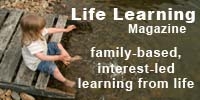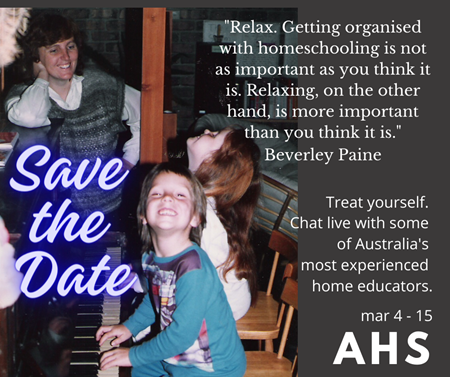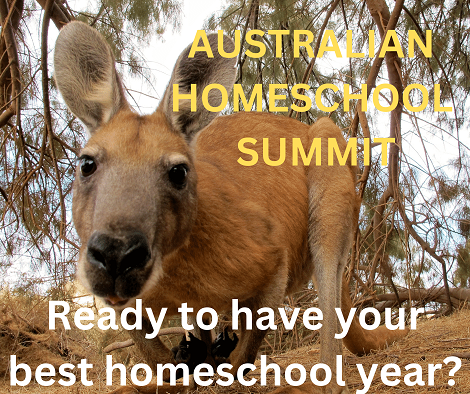|
The Prevalence and Implications of Unschooling in Australia
A high school student recently interviewed Beverley about the nature and prevalence of unschooling in Australia.
What is unschooling and how does it differ from home schooling?
Unschooling families define education differently: they see learning as a continuum that begins very early in life and flows naturally, building on the needs, desires and interests of people. You can't box education into neat little categories or segments because when we learn one thing we are actually learning many others at the same time. Unschooling children don't study one subject or topic at a time, although if they want to concentrate or focus on something they can, it will naturally include learning and practice and activity in many others. This is acknowledged by the learner and the parent. For example, maths will be 'picked up' as it is needed and used to learn other things (how to construct a model, run a small enterprise, organise a party or a camping trip, create a computer program, etc). By 'picked up' I mean find the math tools and resources that enable the task or activity to be completed.
It's difficult to describe an unschooling 'curriculum' - much easier to see what learning has occurred retrospectively than to try to plan an educational 'course' to follow. Unschooling is very flexible and responsive to the person's needs as well as environmental and social factors: it takes advantage of what resources and activities are available, particularly community resources.
Homeschooling can be anything from unschooling to school-at-home (replicating a classroom style approach to education in the home environment). But homeschooling is also very flexible and adaptable and tends to occur as much in the community as it does in the home. Home educators of all types get out and about a lot! You'll find them in museums, playgrounds, places of work, art galleries, at performances, markets, in national parks, after-school activities, swimming pools, everywhere. And throughout the week.
Unschoolers don't tend to think in year levels either: children progress at their own pace according to their individual learning needs and to suit their learning styles. They move on when they have exhausted curiosity or need to follow a particular topic or skill to what attracts their interest next. Life skills are integrated naturally into the unschool 'curriculum': chores, play, relationships, community and interests form the core of their learning programs.
Parents and other adults are viewed more as facilitators and mentors, people ready to guide and help the children learn whatever they want or need to learn. Words and concepts such as 'teach', 'teacher', 'lesson', etc aren't necessary in an unschooling environment. Instead the focus is on learning and building trust that learning is as natural as breathing, and that it is important to move obstacles (such as arbitrary time schedules, deadlines, tests, etc) to learning out of the way and help the learner access whatever he or she needs to help the learning process along.
To what extent is it happening in Australia today?
IT is hard to gauge the extent of unschooling happening in Australia. Authorities register home educating families or students but don't keep records on the pedagogical approach or style. There are many more homeschooling families than unschooling families. Many families transition from homeschooling to unschooling as they begin to have confidence in their children's ability to learn without overt teaching or lessons. Some families are confident to continue educating their children in the same way they have since the children were born. Unschooling is becoming more popular thanks to media focus on it in recent years (perhaps prompted by a well-promoted series of conferences between 2010-13).
Why are people choosing to unschool their children?
This question is different from why people are choosing to homeschool their children, because unschooling is underpinned by a particular educational philosophy. Fewer families are attracted to unschooling than homeschooling as an educational alternative to school. Families choose to homeschool for a variety of reasons. Dominant among those in the last decade is the apparent increase in incidences of bullying in schools - homeschool support groups gain new members whose children have been bullied severely and without appropriate action taken by the schools every day. It's really sad to read those stories of abuse of kids by kids or by teachers.
Being able to meet their children's individual learning needs is another dominant reason why families opt to homeschool them. This is usually after schools have failed to meet those students' needs.
Families tend to unschool their children as a result of getting to know their children's learning needs and styles better - this happens as a natural effect of home educating them. It's an efficient and effective educational approach that works. One of the key components of unschooling is that motivation to learn is usually very high - this makes home education much easier for everyone.
Unschooling also suits some families lifestyle choices, particularly families who are very busy, home-makers, creative, work-from-home, entrepreneurs, or travel. There is usually no delineation between work and play - both are excellent vehicles for learning, providing many learning opportunities for the whole family.
What are the positives and negatives of unschooling for our society?
From my point of view, only positives. Because motivation remains high and learning tends to remain in context and immediately meaningful to the learner, unschooling students become adept autodidacts, much earlier than their schooled peers. They are responsible for their own learning from birth - what they learn, when and how is their choice and responsibility. They can ask for help but it is up to them to learn what they need to achieve their goals. Unschooling parents become involved in local communities (and further afield) to help their children meet their learning needs and facilitate and promote their interests. They aren't restricted to what is available within schools - "the world is their classroom". Unschooling students can study at any level, including university level if that is what they need to do to meet their needs. For society this means unschooling produces self-directed, highly motivated individuals with a strong sense of community responsibility and interaction who generally have an understanding of what they want to achieve and how to do that effectively. One study (by Julia Webb, UK, in the 1990s I believe) demonstrated that unschooled graduates tend to be entrepreneurial or creative individuals, carving careers in areas in which they are passionate or interested.
Home education requires a considerable investment in time, energy and love by the parents. It is also not funded which means an imposition financially: most families live on one income and single parent families live below the poverty line, usually home educating their children while studying at tertiary level part-time to ensure a secure financial life for themselves once the children have grown and left home (or to help pay for the children's tertiary education). Home education - homeschooling and unschooling - isn't an option many families would consider: it will probably remain around about 1-3% of the school-age population. I don't think it will have a huge effect on the way education occurs - schools will continue to exist. However, I do think schools have a lot to learn from home education, particularly in the flexible way home educating families use online learning resources.
What are the implications for our society because of the trend of unschooling?
A sprinkling of unschooled graduates probably won't have a huge effect on society. Home educating graduates tend not to make a fuss about their education as adults. Learning in childhood for them is simply part of a lifelong continuum of learning, not a separate stage of life in which they were taught what they needed to know. Home educating graduates merge into the background of adult employees and employers and no doubt probably work diligently to improve their lives and those around them.
Governments around Australia provide, through legislation and regulation, the ability for families to choose home education as an option but it is not actively promoted by any government or bureaucracy as such. Schools - teachers and principals - still try to dissuade families from home educating their children if the parents inquire about the possibility. I don't see homeschooling or unschooling become anything close to a 'trend' any time soon. I've been a home educator for three decades - apart from a general awareness that the option exists the situation has remained fairly static.
Do you think the laws that allow parents to unschool their children should be changed?
Governments are reluctant to change legislation because of the immense cost involved - so any changes usually reflect a strong need for change. In South Australia the legislation and regulation regarding home education hasn't changed in decades and this reflects the fact that, for now, it is working well to meet the needs of the South Australia community. Reviews of legislation are conducted at least every ten years. The South Australian provision for home education within the Education Act is unique and different to that of other Australian states and territories. From time to time interstate laws and regulations regarding home education provision are changed: at the moment there is an upper house Parliamentary Inquiry into homeschooling in NSW to answer questions being asked by Parliamentarians as a result of discontent with the current registration process by many NSW home educators. I think that laws and regulations need to reflect the needs of the community, both the home educating community and the general community and that this is achievable through the process of consultation and democratic process.

Was this article helpful? Was it worth $1.00 to you?
Your gift of $1 or more helps to keep this site operating
offering encouragement
and reassurance to families
wanting
better outcomes for their children.



Beverley Paine with her children, and their home educated children, relaxing at home.
Together with the support of my family, my aim is to help parents educate their children in stress-free, nurturing environments. In addition to building and maintaing this website, I continue to create and manage local and national home educating networks, help to organise conferences and camps, as well as write for, edit and produce newsletters, resource directories and magazines. I am an active supporter of national, state, regional and local home education groups.
"You've been an inspiration to me, I love the way
you really listen to people." Vanessa
"Whenever I read your writing I always come away
with increased confidence in my ability to provide and
share a wonderful learning journey with my family!" Davina
"Your guidance, understanding, support and words of
wisdom changed our lives. We now offer support and
organise many homeschooling events for others." Lesley
"Thank you once again for your prompt and friendly service.
I am convinced that your books are going to add
quality and peace of mind to my journey of teaching my kids
at home! Just from studying your website, until almost
2am
in the morning, I 've been encouraged!" Louisa
"Thank you for all your many,many reassuring words
over many, many years. You probably don't know exactly how
valuable you are to the Australian Home Education community.
I've been reading your stuff for maybe 8 years or more now.
And I'm very grateful." Gythaa


CLICK HERE
if you want to learn
how to write your own education plans
to suit
your unique children's
individual learning needs?
Or you are looking for quality curriculum and teaching tips...
|
|
Welcome to the World of Home Education
and Learning without School!
We began educating our children in 1985, when our eldest was five. In truth, we had helped them learn what they need to learn since they were born. I am a passionate advocate of allowing children to learn unhindered by unnecessary stress and competition, meeting developmental needs in ways that suit their individual learning styles and preferences. Ours was a homeschooling, unschooling and natural learning family! There are hundreds of articles on this site to help you build confidence as a home educating family. We hope that your home educating adventure is as satisfying as ours was! Beverley Paine
3 ESSENTIAL STEP BY STEP GUIDES
Let experienced home educators Beverley, Tamara and April walk you through HOW to create a learning plan that builds on solid foundations that works for YOUR family AND ticks all the boxes for home educaton registration!
|

Tap into Beverley's
experience
through her books
"Your books, your blogs helped me beyond words... they helped me to find comfort in knowing it is ok to choose exactly what is best for my family." Nisha
"Your books and information are mind blowing and already I am feeling good about this new experience." Diane
"Your guidance, understanding, support & words of wisdom changed our lives." Leslie
"I feel specially inspired by Beverley's words and, the more I read her comments, the more inspired I feel, since my need for support, respect for different parenting styles, and information are fully met." Marijo
|
 |
|

The information on this website is of a general nature only and is not intended as personal or professional advice. This site merges and incorporates 'Homeschool Australia' and 'Unschool Australia'.
The Educating Parent acknowledges the Traditional Aboriginal and Torres Strait Islander Owners, the Custodians of Australia, and pay our respects to Elders past and present and extend that respect to Aboriginal and Torres Strait Islander people viewing this website.

Advertise on this site.













Australia's premier online annual conferences, lifetime access to video and audio recordings, freebies, notes and associated resource guides.
EVERY SUMMIT IS UNIQUE!
$29 each  2023 2023   2022 2022   2021 2021
$25 each  2020 2020  2019 2019   2017 2017
"Biggest and best Aussie homeschool event of the year!"

Home education is a legal alternative
to school education in Australia.
State and Territory governments are responsible
for regulating home education and have different
requirements, however home educating families
are able to develop curriculum and learning programs
to suit the individual needs of their children.

Without revenue from advertising
by educational suppliers and Google Ads
we could not continue to provide information
to home educators. Please support us by letting
our advertisers know that you found them on
The Educating Parent. Thanks!
|
![]() About
About
![]() Blog
Blog
![]() Articles
Articles
![]() Curriculum
Curriculum
![]() Resource Directory
Resource Directory
![]() Shop
Shop
![]() Kids Pages
Kids Pages
![]() Facebook
Facebook

![]() SA
SA ![]() VIC
VIC ![]() NSW
NSW ![]() QLD
QLD ![]() TAS
TAS ![]() ACT
ACT ![]() NT
NT ![]() NSW
NSW ![]() QLD
QLD ![]() SA
SA ![]() WA
WA ![]() TAS
TAS ![]() ACT
ACT ![]() NT
NT 





















